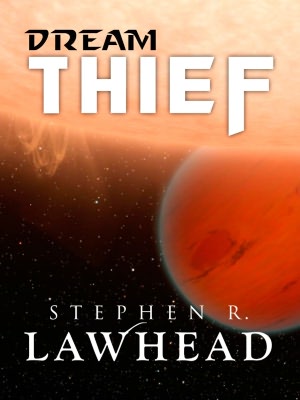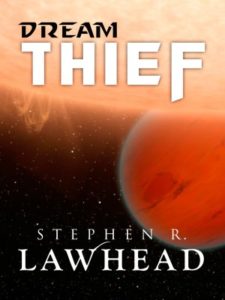
Author:
Ages:
Genres:
BookTags:
Publisher:
Lorehaven may use referral links. As an Amazon Associate, we earn from qualifying purchases.
Dream Thief
Sleep scientist Dr. Spence Reston’s experiments give him dreams in his waking hours. Thus begins a battle for the future of the universe, in which the fate of humankind hangs on the fragile sanity of one man. Science fiction for adult readers.
Stephen R. Lawhead · September 1983 ·
science fiction for adults
 Sleep scientist Dr. Spence Reston is having trouble sleeping. His experiments are giving him dreams that haunt his waking hours, and he has long periods for which he has no memory. Is he losing his mind? Or is there another altogether more frightening explanation? Thus begins a battle for the future of the universe, in which the fate of humankind hangs on the fragile sanity of one man.
Sleep scientist Dr. Spence Reston is having trouble sleeping. His experiments are giving him dreams that haunt his waking hours, and he has long periods for which he has no memory. Is he losing his mind? Or is there another altogether more frightening explanation? Thus begins a battle for the future of the universe, in which the fate of humankind hangs on the fragile sanity of one man.





































The summary of this book sounds SO GOOD. But in reality this book is SO BAD. Oh, the first half is awesome–wandering around Mars, finding the aliens and such. Then he goes back to Earth and the story falls apart. The first crack I noticed is when a minor character who died earlier in the story is inexplicably alive again. Then when the villagers killed the monster with pitchforks and hoes–well, I was finished. I was laughing, actually.
Unfortunately, this excellent idea for a novel is mired by a slow, plodding start, an anemic protagonist and even flakier antagonists, and overall a lack of focus in its storytelling. Once Spence eventually leaves the station, everything picks up: he becomes a more fleshed-out character, the villains become truly menacing, and the actual plot really gets going. No surprise for this author of lore, Lawhead is at his best when dealing with elements of mysticism and cultural history. The part set on Earth is quite intriguing as Lawhead weaves the clues of past and present together. At the risk of sounding cheeky, I feel like Lawhead really wanted to write the last half of the book and the first half was simply the means of getting there.
The real problem with the novel’s conclusion comes from the weak setup. Spence gets the chance to mature and grow, and while I quickly gave up on his supposed “married to the work” scientist persona (he shows precious little interest in his work at the beginning, and abandons it for adventure and romance at the first opportunity), he becomes a likeable enough plucky hero by the end of the novel that I could root for his success. In actuality, this novel would have been far more interesting if the main conflict had been internal, with the dreams actually being an organic exploration of his own psyche wrestling with what he has always believed to be true and the truth he must come to accept. As it is, the two henchmen we meet to begin with are traditionally flat villains who only desire power (I could almost see them fingering their black mustaches), and the eventual true mastermind of the plot is made impotent by the time of his ultimate reveal (which failed to surprise, considering the obvious hints dropped), leading to a disappointing and anticlimactic endgame for the narrative. In my opinion, this is one story that would have worked better without outside villains.
The book has its moments of interest and engagement, but ultimately fails to rise above its inherent structural weaknesses. If you’re just starting with Lawhead, read his fantasy. This example of his foray into science fiction leaves much to be desired.